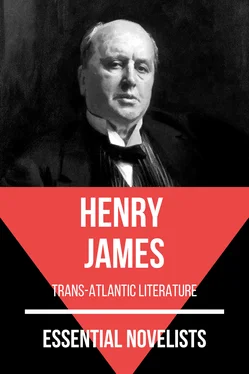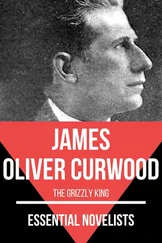“Are they very ugly? They try to make us believe in America that they’re all handsome and magnificent and that they wear wonderful robes and crowns.”
“Ah, the robes and crowns are gone out of fashion,” said Lord Warburton, “like your tomahawks and revolvers.”
“I’m sorry for that; I think an aristocracy ought to be splendid,” Henrietta declared. “If it’s not that, what is it?”
“Oh, you know, it isn’t much, at the best,” her neighbour allowed. “Won’t you have a potato?”
“I don’t care much for these European potatoes. I shouldn’t know you from an ordinary American gentleman.”
“Do talk to me as if I were one,” said Lord Warburton. “I don’t see how you manage to get on without potatoes; you must find so few things to eat over here.”
Henrietta was silent a little; there was a chance he was not sincere. “I’ve had hardly any appetite since I’ve been here,” she went on at last; “so it doesn’t much matter. I don’t approve of you, you know; I feel as if I ought to tell you that.”
“Don’t approve of me?”
“Yes; I don’t suppose any one ever said such a thing to you before, did they? I don’t approve of lords as an institution. I think the world has got beyond them—far beyond.”
“Oh, so do I. I don’t approve of myself in the least. Sometimes it comes over me—how I should object to myself if I were not myself, don’t you know? But that’s rather good, by the way—not to be vainglorious.”
“Why don’t you give it up then?” Miss Stackpole enquired.
“Give up—a—?” asked Lord Warburton, meeting her harsh inflexion with a very mellow one.
“Give up being a lord.”
“Oh, I’m so little of one! One would really forget all about it if you wretched Americans were not constantly reminding one. However, I do think of giving it up, the little there is left of it, one of these days.”
“I should like to see you do it!” Henrietta exclaimed rather grimly.
“I’ll invite you to the ceremony; we’ll have a supper and a dance.”
“Well,” said Miss Stackpole, “I like to see all sides. I don’t approve of a privileged class, but I like to hear what they have to say for themselves.”
“Mighty little, as you see!”
“I should like to draw you out a little more,” Henrietta continued. “But you’re always looking away. You’re afraid of meeting my eye. I see you want to escape me.”
“No, I’m only looking for those despised potatoes.”
“Please explain about that young lady—your sister—then. I don’t understand about her. Is she a Lady?”
“She’s a capital good girl.”
“I don’t like the way you say that—as if you wanted to change the subject. Is her position inferior to yours?”
“We neither of us have any position to speak of; but she’s better off than I, because she has none of the bother.”
“Yes, she doesn’t look as if she had much bother. I wish I had as little bother as that. You do produce quiet people over here, whatever else you may do.”
“Ah, you see one takes life easily, on the whole,” said Lord Warburton. “And then you know we’re very dull. Ah, we can be dull when we try!”
“I should advise you to try something else. I shouldn’t know what to talk to your sister about; she looks so different. Is that silver cross a badge?”
“A badge?”
“A sign of rank.”
Lord Warburton’s glance had wandered a good deal, but at this it met the gaze of his neighbour. “Oh yes,” he answered in a moment; “the women go in for those things. The silver cross is worn by the eldest daughters of Viscounts.” Which was his harmless revenge for having occasionally had his credulity too easily engaged in America. After luncheon he proposed to Isabel to come into the gallery and look at the pictures; and though she knew he had seen the pictures twenty times she complied without criticising this pretext. Her conscience now was very easy; ever since she sent him her letter she had felt particularly light of spirit. He walked slowly to the end of the gallery, staring at its contents and saying nothing; and then he suddenly broke out: “I hoped you wouldn’t write to me that way.”
“It was the only way, Lord Warburton,” said the girl. “Do try and believe that.”
“If I could believe it of course I should let you alone. But we can’t believe by willing it; and I confess I don’t understand. I could understand your disliking me; that I could understand well. But that you should admit you do—”
“What have I admitted?” Isabel interrupted, turning slightly pale.
“That you think me a good fellow; isn’t that it?” She said nothing, and he went on: “You don’t seem to have any reason, and that gives me a sense of injustice.”
“I have a reason, Lord Warburton.” She said it in a tone that made his heart contract.
“I should like very much to know it.”
“I’ll tell you some day when there’s more to show for it.”
“Excuse my saying that in the mean time I must doubt of it.”
“You make me very unhappy,” said Isabel.
“I’m not sorry for that; it may help you to know how I feel. Will you kindly answer me a question?” Isabel made no audible assent, but he apparently saw in her eyes something that gave him courage to go on. “Do you prefer some one else?”
“That’s a question I’d rather not answer.”
“Ah, you do then!” her suitor murmured with bitterness.
The bitterness touched her, and she cried out: “You’re mistaken! I don’t.”
He sat down on a bench, unceremoniously, doggedly, like a man in trouble; leaning his elbows on his knees and staring at the floor. “I can’t even be glad of that,” he said at last, throwing himself back against the wall; “for that would be an excuse.”
She raised her eyebrows in surprise. “An excuse? Must I excuse myself?”
He paid, however, no answer to the question. Another idea had come into his head. “Is it my political opinions? Do you think I go too far?”
“I can’t object to your political opinions, because I don’t understand them.”
“You don’t care what I think!” he cried, getting up. “It’s all the same to you.”
Isabel walked to the other side of the gallery and stood there showing him her charming back, her light slim figure, the length of her white neck as she bent her head, and the density of her dark braids. She stopped in front of a small picture as if for the purpose of examining it; and there was something so young and free in her movement that her very pliancy seemed to mock at him. Her eyes, however, saw nothing; they had suddenly been suffused with tears. In a moment he followed her, and by this time she had brushed her tears away; but when she turned round her face was pale and the expression of her eyes strange. “That reason that I wouldn’t tell you—I’ll tell it you after all. It’s that I can’t escape my fate.”
“Your fate?”
“I should try to escape it if I were to marry you.”
“I don’t understand. Why should not that be your fate as well as anything else?”
“Because it’s not,” said Isabel femininely. “I know it’s not. It’s not my fate to give up—I know it can’t be.”
Poor Lord Warburton stared, an interrogative point in either eye. “Do you call marrying me giving up?”
“Not in the usual sense. It’s getting—getting—getting a great deal. But it’s giving up other chances.”
“Other chances for what?”
“I don’t mean chances to marry,” said Isabel, her colour quickly coming back to her. And then she stopped, looking down with a deep frown, as if it were hopeless to attempt to make her meaning clear.
Читать дальше












